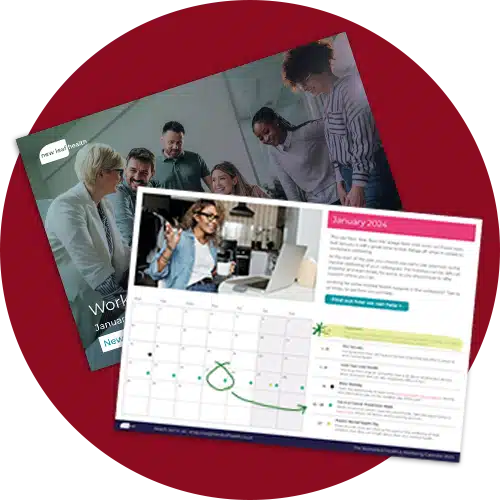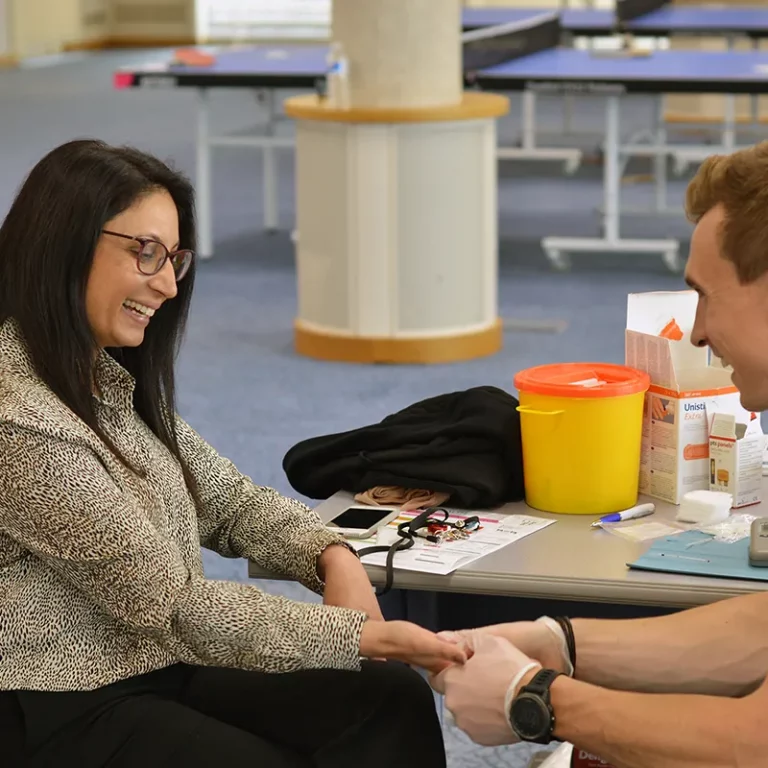Know Your Numbers Week 2024
The UK’s Most Important Health Campaign
- Get to know your health numbers
- Identify hidden risks
- Make positive health changes

Hundreds of UK businesses love working with us
What is Know Your Numbers Week?
Know Your Numbers Week is a wellbeing campaign in the UK to help people get to know their health stats.
Primarily, the campaign focuses on blood pressure. Here at New Leaf Health, we advocate for awareness around three key stats:
- Blood pressure
- Cholesterol
- Blood glucose
These three stats are crucial to the health of your heart and blood vessels, as well as other major organs. Often, if you have any problems with these stats, you won’t have symptoms.
The only way to find out if you have problems with blood pressure, cholesterol or blood glucose is to get tested regularly.

Why is Monitoring Blood Pressure So Important?
1 in 3 UK Adults have High Blood Pressure
According to the Health Survey for England (NHS 2021), around 30% of adults in England are living with hypertension, including 15% with untreated high BP.
More Deprived Areas Have Higher Rates of Hypertension
In the same NHS study, researchers found hypertension had a prevalance of 23% in less deprived areas, and up to 40% in more deprived areas – almost double the likelihood.
High Blood Pressure is know as the Silent Killer
According to the NHS, high blood pressure usually has no symptoms, meaning that the only way to diagnose the condition is by havaing a blood pressure test.
High Blood Pressure is the #1 Risk Factor for Death
Globally, high blood pressure is the number one risk factor for death. Additonally, the condition accounts for around 50% of all heart disease and stroke-related deaths worldwide.

When is Know Your Numbers Week?
The Know Your Numbers campaign typically takes place during the first full week of September.
Blood Pressure UK, who organises the campaign, has confirmed that this year’s event will take place from 2-8 September 2024.
Want to keep up to date on wellbeing campaigns throughout the year? Click below to download our free Workplace Wellbeing Calendar!
Know Your Numbers Testing
It’s easy to get involved with Know Your Numbers Week. It’s all about helping your staff to get their blood pressure tested!
There are a few ways you could approach this:
- Find a local pharmacy that offers free testing for over 40s – and encourage staff to go.
- Rent or buy your own blood pressure machine to use in the workplace.
- Host a facilitated workplace health screening, where staff can find out their cholesterol and diabetes risk, too.

High Blood Pressure Puts Extra Strain on Your Heart and Other Organs
Think about your cardiovascular system like the plumbing in a house. The pressure needs to be high enough to feed your taps, shower and radiators, but not so high that it causes a pipe to burst or a valve to stop working.
Instead of a hefty plumbing bill, though, when your blood pressure is too high, it damages your blood vessels and organs. Ultimately, this can cause irreversible damage, and even lead to serious conditions, such as:
- heart disease
- heart attacks
- strokes
- heart failure
- peripheral arterial disease
- aortic aneurysms
- kidney disease
- vascular dementia
More Information about High Blood Pressure
Does High Blood Pressure have any Symptoms?
Generally speaking, high blood pressure doesn’t have any symptoms. Almost all people with the condition only find out because they get their blood pressure tested – either as part of a health check, or as part of tests for another condition.
According to the British Heart Foundation, the following symptoms can indicate very high blood pressure:
- Blurred vision
- Nosebleeds
- Shortness of breath
- Chest pain
- Dizziness
- Headaches
It’s important to note, though, that these symptoms can be related to many other conditions, so aren’t a relaiable indication of high blood pressure.
Who Should Have a Blood Pressure Check?
High blood presure is a disease that can affect anyone – highlighting this is one of the main aims of the Know Your Numbers campaign.
Everyone should have their blood pressure checked regularly, but there are some groups that are more at risk than others. You should get your blood pressure checked regularly if you:
- Eat a high-fat diet
- Eat a high-salt diet
- Don’t exercise
- Are overweight
- Smoke
- Drink too much alcohol
- Are stressed
- Take some recreational drugs
- Are older – the risk of developing high blood pressure increases as you get older
- Have a family history of high blood pressure
- Are of Afro-Caribbean or South Asian origin
NHS Health Checks are offered to adults aged 40 – 74 who don’t have certain pre-existing conditions. So, if you don’t go for your NHS Health Check, you should aim to be regularly testing your blood pressure from the age of 40.
That being said, high blood pressure is actually on the rise amongst young people (16 – 24) in the UK. 5 in 100 young men have high blood pressure, and 1 in 100 young women have it.
In other words, getting your blood pressure tested, no matter how old you are, is never a bad thing.

